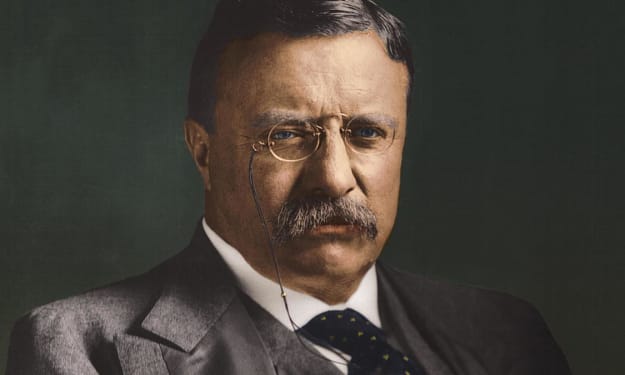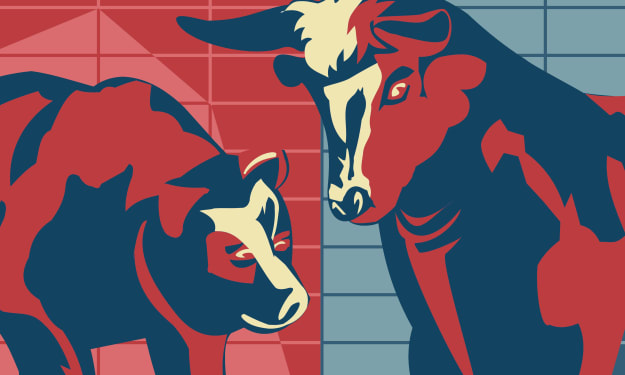Fred Eugene Park
Bio
Fred Park is a writer, singer and guitarist with a deep passion for music, sports and history. Fred graduated from Purchase College in 2016 with a BA in history.
Stories (38/0)
Fascinating Books About American Politicians
In the two-century history of American democracy, there have been many influential and pivotal political actors that forever changed the course and narrative of American politics, sometimes in a positive manner, though often in ways far more complex. From Abraham Lincoln to Franklin D. Roosevelt, many presidents and other holders of political offices have used their power and influence to make profound change, for better or worse.
By Fred Eugene Park5 years ago in The Swamp
10 Adorable Pet Calendars You Need to Buy
While people often cannot agree on many things these days, there are a few universal truths that transcend almost all conflicts. One such truth is that small, furry animals are adorable. Accordingly, it is nice to surround oneself with pets and images of these furry companions.
By Fred Eugene Park5 years ago in Petlife
10 Riddim Artists You Need to Hear
In today's age of global communication, new levels of artistic collaboration and influence are possible. With the spread of more artistic content over the internet, music is becoming more eclectic and evolving at a rapid pace. Accordingly, no form of music has evolved or spread as rapidly as EDM and other synthesizer-based music—from the simpler times of synth pop all the way to heavier, more aggressive, modern genres like future bass and other types of bass music. Also, with the influence of the internet, genres like dubstep have gained previously unfathomed mainstream exposure and immense popularity over the past decade or so, with special thanks to artists like Skrillex. With the widespread popularity of the genre, artists have drawn in influence from other non-EDM genres to make their music even more unique.
By Fred Eugene Park5 years ago in Beat
The 10 Best Books Written by Vietnam War Veterans
Few American military conflicts of the 20th century were as controversial as the Vietnam War. Being the first major American military blunder to happen, more or less in the public eye, it comes as no surprise that there has been a lot of literature, both fiction and nonfiction, centered around it. However, the deep division brought on by the conflict served to distort our understanding of the events and the impact it had on our country.
By Fred Eugene Park5 years ago in Serve
What Is the Origin of Bull Market and Bear Market Terms?
With its global financial epicenter in New York City, the stock market has long been a source of curiosity for many Americans. With numerous popular films like Wall Street and The Wolf of Wall Street uncovering the unsavory side of investment, people are often skeptical of the financial industry. Though few truly understand the inner workings of the world economy, they are fascinated by the culture around it and are envious of those who thrive off of trading in the stock market. If you have an intermediate or advanced knowledge about the world of finance or investment, you have at very least probably heard the terms bull and bear markets. These terms are used to describe the performance of the stock exchange in terms of stock prices and subsequent investor confidence. There are few factors more important in the fluctuations of the market than the state of investor confidence. The state of the market hinges greatly on the confidence of the investor, meaning that high confidence is good for the market and low confidence is obviously bad. In fact, before the Great Depression, many of the large economic collapses in history were referred to as "panics," occurring every few decades, despite the general upward trend of the nineteenth century. The origin of bull market and bear market terms still stands today, though, as vocabulary has evolved to describe trends in the market, and are exceedingly important for anyone with a vetted interest in the stock market to know.
By Fred Eugene Park5 years ago in Trader
10 Books About WWI That Will Make You Think
In today's society, people are too often ignorant of certain historical events of great significance. While pop culture has heavily analyzed World War II—among other wars in American history (even that of today's ongoing war in the Middle East with many must read books about the war in Afghanistan)—in film, literature, and television, they have paid considerably less tribute to World War I. Though it was an incredibly important event in its own right, many people simply see it as the prequel to World War II. Those same people likely are unaware that, in its time, World War I was known as the Great War, or that the spread of the so called "Spanish Flu," worsened by the war, was one of the deadliest epidemics in recorded history (far deadlier than the war itself). However, if you wish to learn more about this critical event in world history, there are still many books about WWI that cover every aspect of the war from trench warfare, to dogfights in the sky, and much more.
By Fred Eugene Park5 years ago in Serve
What Will Bitcoin Do in a Recession?
More than 10 years after the devastating economic recession of 2008 from the collapse of Goldman Sachs and other large financial firms, many Americans and people across the world have an ever-growing fear and distrust for the established banks and financial institutions that also make up the monetary backbone of the global economy. With the implosion of the housing market largely spurring on the decline, many Americans lost their homes and other assets. In a time when parties across the globe are devising new systems of financial commerce and banking, forerunners in the cryptocurrency field, such as Bitcoin, have risen to great prominence. The deviation from fiat currency, by a surprising number of institutions and no matter how large a commitment, has gained cryptocurrencies a deserved amount of attention. The exciting concept behind this alternative currencies can make it hard to weigh the legitimate risks and benefits of investing in them. With the mounting uncertainty of the current market, more people, at all levels of society, have looked to Bitcoin as an exciting way to solve their problems. Though Bitcoin subverts some of the most derided aspects of the traditional banking system, it is certainly not wholly immune to the scourge of a global financial recession. Due to the new territory that institutions like Bitcoin have broken, and the uncertainty of the markets, the biggest question on people's minds is what will Bitcoin do in a recession?
By Fred Eugene Park5 years ago in The Chain
The 10 Most Durable Outdoor Basketball Shoes
As any player will attest, basketball is an intense sport that demands a great deal of energy and stamina. That being said, your basketball shoes must also withstand a great deal of wear and tear over many games, requiring a great deal of flexibility and elasticity, as well as comfort and support. (There's a reason basketball players don't wear Chuck Taylors anymore!) From the first Air Jordan sneakers to the Nike Air shoes and the latest LeBron products, there has always been a lot of hype around basketball sneaker releases.
By Fred Eugene Park5 years ago in Unbalanced
Why Military Veterans Have a Hard Time Getting a Job
There are few bigger sacrifices that an individual can make than fighting for their country. Around the world, our military helps to keep our citizens and civilians everywhere safe from terror. Though much respect and admiration is extended to the American veterans of foreign war, considerably less help and resources are available to these brave men and women when they leave the armed forces.
By Fred Eugene Park5 years ago in Serve
Difference Between Smoking and Eating Edibles
The effects of marijuana are well known and hard to deny. With the rising tide of legalization bringing legal weed to people in various states, more and more people are being exposed to the various alternative ways of consuming it. While forms like vaping have a relatively similar effect to smoking, not every method can claim this.
By Fred Eugene Park5 years ago in Potent
10 Biographies About Henry Ford Worth Reading
Though we often take our modern world for granted, much of the technology that is a part of our everyday life has not been around for very long in the scope of human history. Though we have a rich transportation infrastructure of interstate highways and other roads, there was a time when roads were rough, narrow trails and the fastest way to cross the country was by rail. Thanks to the innovation of the automobile, the government and others had a reason to build suitable routes of travel throughout the country.
By Fred Eugene Park5 years ago in Wheel
- Top Story - December 2018
The 10 Oldest Polaroid CamerasTop Story - December 2018
The ability to produce a photographic image has revolutionized the modern world in many ways. With a true visual record of events and people, the oldest photographs in history seem not only closer in time, but in culture and accessibility. When the camera and the photographs it could produce became a viable commodity, the contemporary world began to be more readily documented and understood by a greater number of people. Though the evolution of photography itself served to forever advance and change society, further advancements in the field would come to make them cheaper and more immediate.
By Fred Eugene Park5 years ago in Photography













